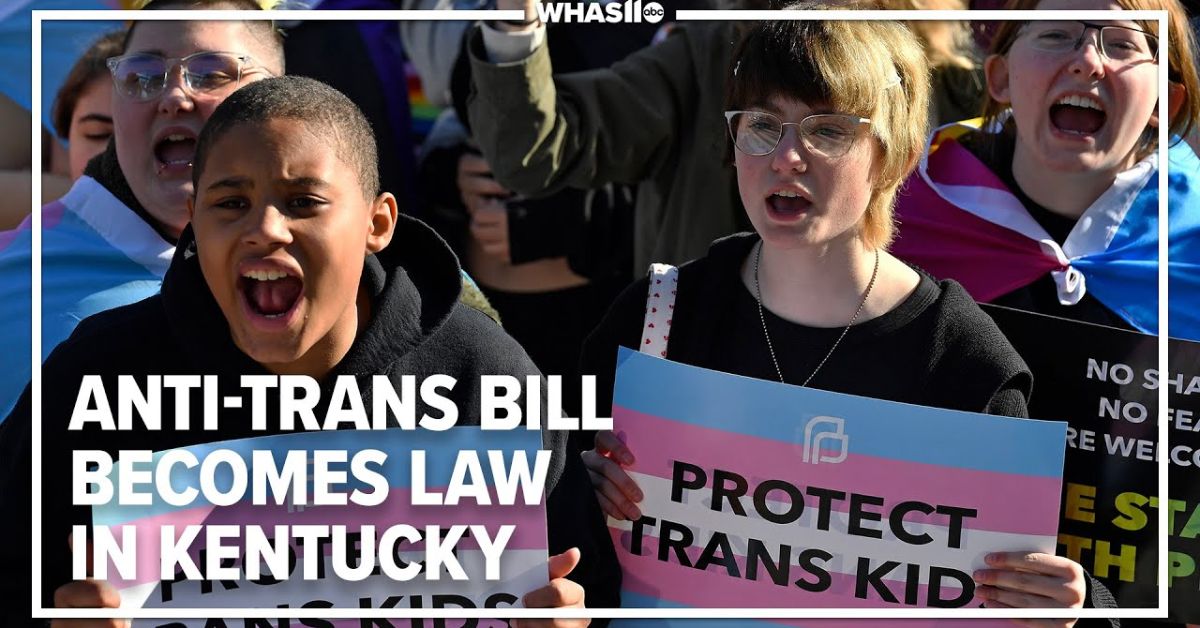On Wednesday, the governor of West Virginia signed a bill that prohibits minors from receiving services related to gender transition. Bans also appear to be close to passing in both Idaho and Missouri.
On Wednesday, the Republican-controlled Kentucky legislature voted to override the governor’s veto of a bill that would place a number of additional limitations on transg*nder youth, including a ban on access to what clinicians refer to as gender-affirming health care.
Democratic Governor Andy Beshear on Friday vetoed a law that was overcome by Republican majorities in the State House and Senate. The bill had been condemned by L.G.B.T.Q. rights groups as one of the most draconian in the country.
The regulation, which started relatively basic but expanded into a much broader bundle of limitations, specifically prohibits operations, puberty blockers, and hormone therapy for minors. Additionally, it prohibits local educational agencies from mandating or advocating that students use pronouns that “do not conform to a student’s biological s*x as indicated on the student’s original, unedited birth certificate.”
Doctors are required by law to stop providing care to patients who are undergoing gender transition, and if they believe doing so will “harm the minor,” they must create a plan to “systematically” phase out therapy over time.
We’ve written a few other articles recently about what’s going on in Kentucky. Check out the links below to learn about what happened in Kentucky.
- Kentucky GOP Overrides Governor Veto of Bill Limiting Transgender Rights
- Kentucky School Shooter Who Killed Three Girls in 1997 Seeks Parole After 25 Years in Prison
The law restricts what can be taught and discussed in schools, including the new laws controlling transg*nder children, a ban on teaching s*xuality to students in grades below sixth, and a prohibition on teaching about gender identity and s*xual orientation in any grade.
This bill is part of a larger movement by Republican state legislators to impose new restrictions and regulations on transg*nder youngsters in recent years. Arizona, Florida, Georgia, Iowa, Tennessee, and Utah are just ten of the states to have approved bans on transition care.

West Virginia’s governor signed a bill banning transition treatment for kids on Wednesday; the law requires a “diagnosed as suffering from severe gender dysphoria” from two medical professionals as well as parental consent. Erin Reed, a legislative analyst who is opposed to legislation that limits access to transg*nder medical treatment, said that approval of prohibitions appears imminent in two more states, Idaho and Missouri.
“We are going to have to survey the damage” after this legislative session concludes, Ms. Reed said. “But I do think that most of these bills are going to be overturned in court, and I’m hopeful that the next wave of news in the summer brings some level of relief to trans-Americans.”
Arkansas was the first state to adopt a ban on transg*nder kids receiving medical care, but the law has not gone into effect due to legal challenges. The Kentucky ACLU has promised to oppose the bill in court, which means that its implementation will be slowed down as well.
The quickness with which the Kentucky override occurred was not surprising, considering the conservative majority in the state legislature. About all of the votes were cast along partisan lines.
Mr. Beshear, a first-term governor, won the governorship after defeating the unpopular Republican incumbent, Matt Bevin, who had been at odds with the state’s educators for much of his tenure. Mr. Beshear is running for re-election this year, and winning in a state that former President Donald J. Trump won by 26 percentage points in 2020 is no easy task.
Yet, Mr. Beshear has kept his popularity high by concentrating on effective government, such as the state’s response to the grueling barrage of natural catastrophes that has hit Kentucky over the past four years.
March 30th The New York Times tweeted, “Republican lawmakers in Kentucky overrode a veto to pass a ban on transition care for trans youth and limit discussion of gender identity in schools.”
Breaking News: Republican lawmakers in Kentucky overrode a veto to pass a ban on transition care for trans youth and limit discussion of gender identity in schools. https://t.co/pnwdgjEIDA
— The New York Times (@nytimes) March 29, 2023
Nonetheless, the political tensions around themes of gender, s*xuality, and education are significantly higher. Last month, a group of Republican state senators tried to water down the law by deleting some of the more contentious provisions, but their efforts were unsuccessful in the face of a letter-writing campaign organized by a conservative Christian group. Then on Wednesday, hundreds of protesters flocked to the State Capitol to voice their opposition to the bill.
Republican state senator and bill author Max Wise said that the bill’s purpose was to “was to strengthen parental engagement and communication in children’s education while protecting the safety of our children,” while screams and shouting from protesters echoed in the background.
Mr. Wise was particularly offended by Mr. Beshear’s comments explaining his veto, in which he claimed that the plan would transform teachers into detectives.
We have written a few other articles recently about what’s going on in Kentucky. Check out the links below:
- In the Neighbourhood of $1,000,000 in Northern Kentucky, a Mega Millions Ticket Was Sold!
- Rich Strike Wins the Kentucky Derby in 2022 (Latest News)
In that statement, Mr. Beshear also said that the bill “strips freedom from parents to make personal family decisions” and warned that it would “cause an increase in suicide among Kentucky’s youth.”
Transg*nder activist Henry Berg-Brousseau, 24 years old, who spoke against such bills during legislative hearings, committed suicide in December. His mother, Democratic state legislator Dr. Karen Berg, opposed the legislation on Wednesday.
“To say this is a bill protecting children is completely disingenuous,” she stated on the Senate floor. To label this legislation as protecting parents’ rights is an insult to my intelligence.